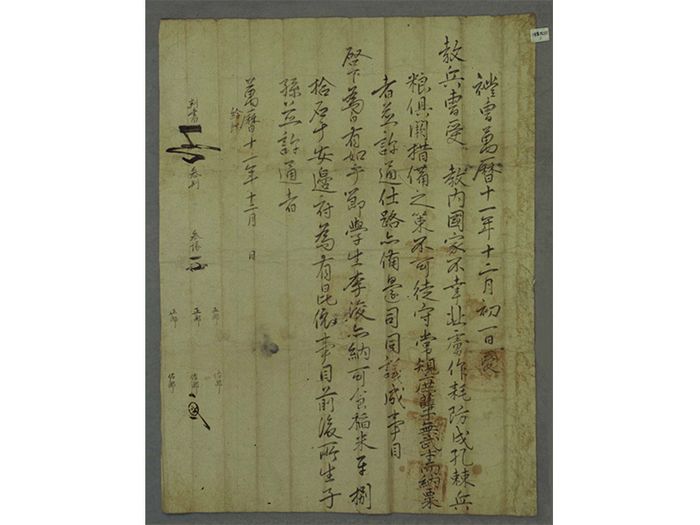"(Translation) 1583年 李浚 許通牒"의 두 판 사이의 차이
(→Student 2 : Kim Young and King Kwong Wong) |
(→Student 2 : Kim Young and King Kwong Wong) |
||
| 94번째 줄: | 94번째 줄: | ||
2. 措備之策 不可徒守常規 庶孼無武才 而納粟者 並許通仕路 亦備邊司同議 成事目 啓下爲白有如乎 | 2. 措備之策 不可徒守常規 庶孼無武才 而納粟者 並許通仕路 亦備邊司同議 成事目 啓下爲白有如乎 | ||
| − | As for the strategy of planning and preparation, it should not merely stick to conventions. The sons of concubines do not have martial talents. And for the those who pay grains, they should be allowed to go through the path of serving the government. | + | As for the strategy of planning and preparation, it should not merely stick to conventions. The sons of concubines do not have martial talents. And for the those who pay grains, they should be allowed to go through the path of serving the government. As for this [recommendation], the Border Defense Council also agreed and became an article. Deliver it to subordinates and follow as it stated. |
2017년 7월 17일 (월) 16:55 판
| Primary Source | ||
|---|---|---|
 |
Title | |
| English | A Document endorsing the son of a concubine : The Case of Yi Eonjeok’s (李彦迪, 1491-1553) grandson from concubinage | |
| Chinese | 1583年 李浚 許通牒 | |
| Korean(RR) | 1583년 이준 허통첩(Lee Joon Heotongcheop) | |
| Text Details | ||
| Genre | Social Life and Economic Strategies | |
| Type | Permissions | |
| Author(s) | 禮曺 | |
| Year | 1583 | |
| Source | ||
| Key Concepts | ||
| Translation Info | ||
| Translator(s) | Participants of 2017 Summer Hanmun Workshop (Advanced Translation Group) | |
| Editor(s) | ||
| Year | 2017 | |
목차
- 1 Introduction
- 2 Original Script
- 3 Discussion Questions
- 4 Further Readings
- 5 References
- 6 Translation
- 6.1 Student 1 : (Write your name)
- 6.2 Student 2 : Kim Young and King Kwong Wong
- 6.3 Student 3 : (Write your name)
- 6.4 Student 4 : (Write your name)
- 6.5 Student 5 : (Write your name)
- 6.6 Student 6 : (Write your name)
- 6.7 Student 7 : (Write your name)
- 6.8 Student 8 : (Write your name)
- 6.9 Student 9 : (Write your name)
- 6.10 Student 10 : (Write your name)
- 6.11 Student 11 : (Write your name)
- 6.12 Student 12 : (Write your name)
- 6.13 Student 13 : (Write your name)
- 6.14 Student 14 : (Write your name)
- 7 Further Readings
Introduction
Original Script
| Classical Chinese | English |
|---|---|
|
1. 禮曺 萬曆十一年十二月初一日 受 敎 兵曹受敎內 國家不幸 北虜作耗 防戌孔棘 兵 粮俱闕 2. 措備之策 不可徒守常規 庶孼無武才 而納粟 者 並許通仕路 亦備邊司同議 成事目 啓下爲白有如乎 3. 節學生李浚 亦納可食稻米平捌 拾石于安邊府爲有昆 依事目 前後所生子 孫 並許通者 萬曆十一年十二月日 給牒 判書 (手決) 參判 參議 (手決) 正郞 正郞 正郞 佐郞 佐郞 (手決) 佐郞 |
(translation) |
Discussion Questions
Further Readings
References
Translation
Student 1 : (Write your name)
- Discussion Questions:
Student 2 : Kim Young and King Kwong Wong
2. 措備之策 不可徒守常規 庶孼無武才 而納粟者 並許通仕路 亦備邊司同議 成事目 啓下爲白有如乎
As for the strategy of planning and preparation, it should not merely stick to conventions. The sons of concubines do not have martial talents. And for the those who pay grains, they should be allowed to go through the path of serving the government. As for this [recommendation], the Border Defense Council also agreed and became an article. Deliver it to subordinates and follow as it stated.
- Discussion Questions:
Student 3 : (Write your name)
- Discussion Questions:
Student 4 : (Write your name)
- Discussion Questions:
Student 5 : (Write your name)
- Discussion Questions:
Student 6 : (Write your name)
- Discussion Questions:
Student 7 : (Write your name)
- Discussion Questions:
Student 8 : (Write your name)
- Discussion Questions:
Student 9 : (Write your name)
- Discussion Questions:
Student 10 : (Write your name)
- Discussion Questions:
Student 11 : (Write your name)
- Discussion Questions:
Student 12 : (Write your name)
- Discussion Questions:
Student 13 : (Write your name)
- Discussion Questions:
Student 14 : (Write your name)
- Discussion Questions: